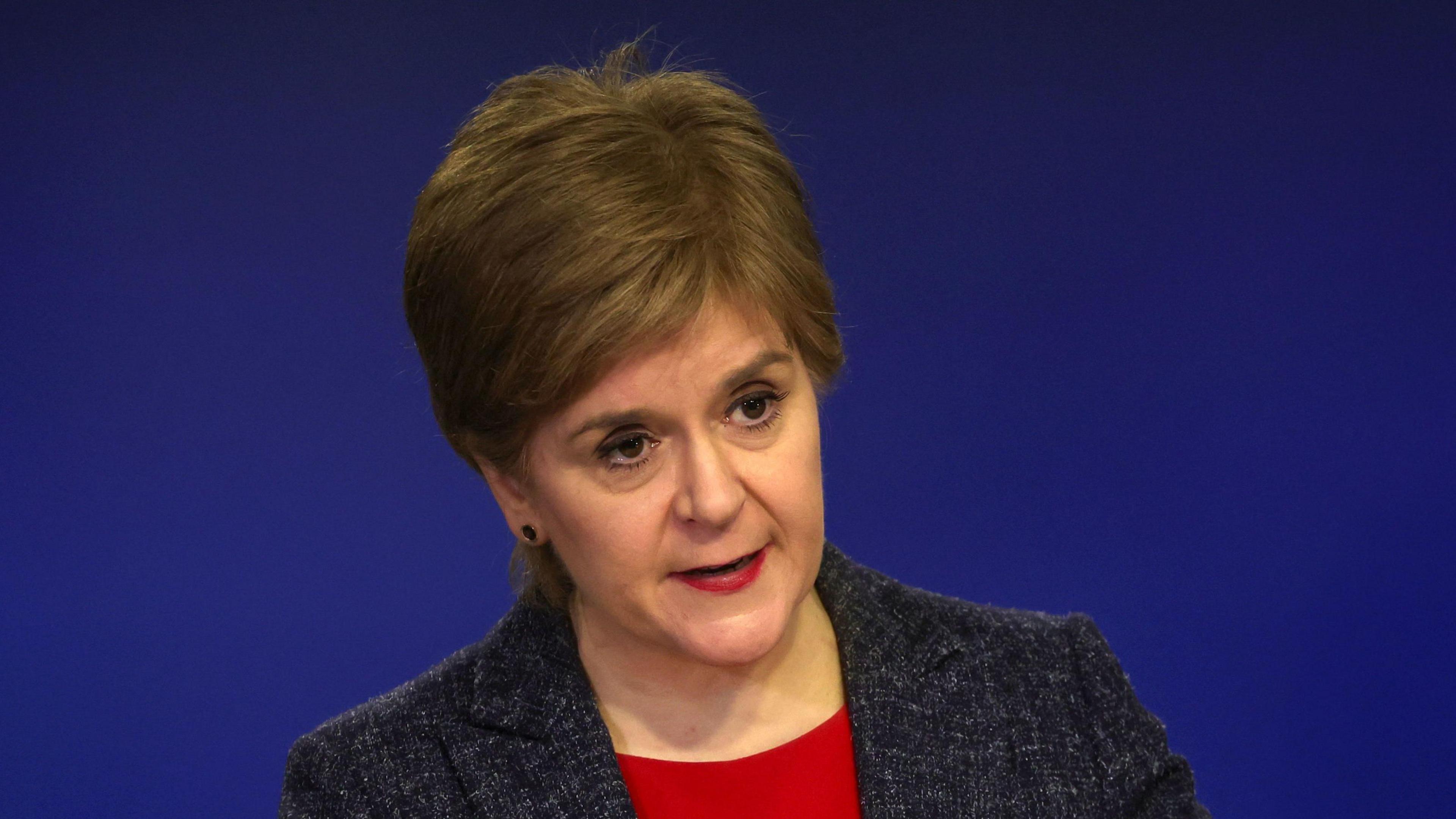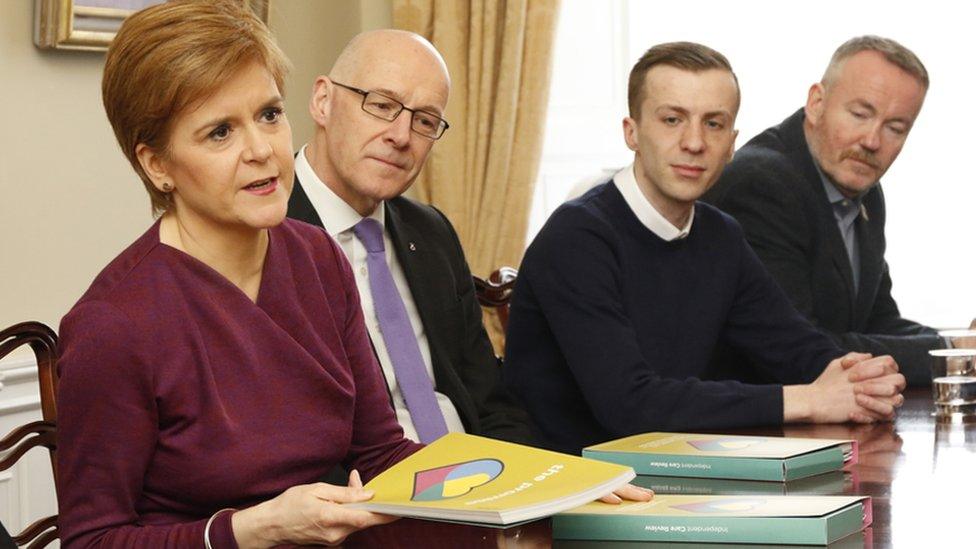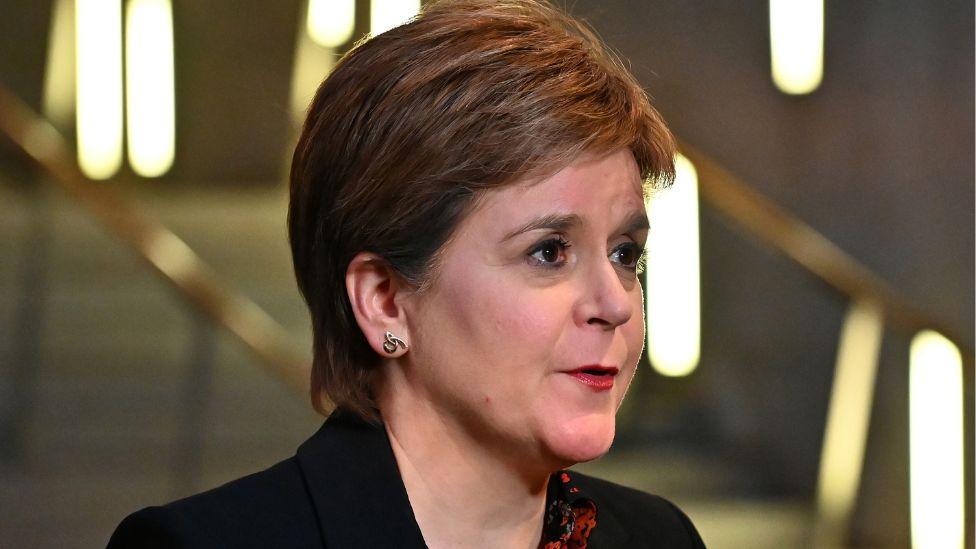Government care plan progressing 'too slowly' - watchdogs

In 2020, Nicola Sturgeon pledged to improve the lives of children and young people in care
- Published
Plans to improve Scotland's care system have progressed too slowly, according to a joint report by two public sector watchdogs.
Audit Scotland and the Accounts Commission said there was confusion over how organisations should deliver The Promise - a pledge made to improve the lives of care-experienced children and adults by 2030.
Stephen Boyle, Auditor General for Scotland, said that initial planning about how The Promise would be delivered had not provided "a strong platform for success."
In a joint statement, the Scottish government, Cosla, Solace, The Promise Scotland and The Independent Strategic Advisor for the Promise said they would review the recommendations made in the report.
They added that they would work in the "best way possible for children, families and care experienced adults," adding that they "remain steadfastly committed to working in partnership to keep the Promise."
What is The Promise?
The Promise was launched during Nicola Sturgeon's time as first minister to improve the lives of care-experienced children and young people.
It accepted the 2020 Independent Care Review, which found the system was "fractured, bureaucratic and unfeeling."
In 2022, Sturgeon unveiled an 80-step plan which included ending custody for under-18s and creating a national allowance for foster and kinship carers.
The reforms also pledged to redesign children's hearings and overhaul governance by 2030.
Sturgeon has since admitted the programme faces push back from "vested interests" and warned progress has been slow.
In February this year, first minister John Swinney wrote an open letter, external to the "care-experienced community", in which he acknowledged there were areas where the government "must work harder and faster to bring the changes required".
What does the report say?
The report said that plans have lacked detail and direction for individual sectors, and new structures created by the Scottish government have lacked clarity about their roles and responsibilities.
It also highlighted that efforts to streamline The Promise's complex governance arrangements have been insufficient, making collective accountability difficult.
Problems reach back to The Promise's launch in 2020, the report says, when there was no initial assessment of what resources or skills were needed to meet the 2030 deadline, and no definition of how success would be measured.
A framework to track progress was only agreed in December 2024, but Audit Scotland said it needed more work.
The report added that although the Scottish government is recording national data, it is not yet good enough to show if services are improving lives.
It also said that although Scottish government funding for The Promise has increased, it was difficult to quantify and track.
It highlighted that a £500m Whole Family Wellbeing Fund had been introduced in 2022/23, but it was unclear how that amount was arrived at, adding that only £148m of it had so far been allocated.
Mr Boyle said: "The Scottish government needs to work with its partners to clearly set out the action that will be taken over the next five years to deliver The Promise, and how that work will be resourced."
Angela Leitch, a member of the Accounts Commission, said that "greater pace and momentum" was now needed.
"Local bodies need to work with their national partners to clarify roles and responsibilities, and prioritise the work needed to achieve The Promise's aims," she added.
Scottish Conservative spokeswoman for children and young people Roz McCall said the report was an "absolutely damning verdict on one of the SNP's flagship policies."
She said: "Their plans lack any detail, and it is astonishing that there was never any assessment put in place to define if the policy had been a success or not."
Martin Whitfield ,Scottish Labour's spokesman for children and young people, described the report as "damning" and said that there has been "a lack of leadership and delivery under the SNP".
Scottish Liberal Democrat communities spokesman Willie Rennie MSP said the SNP had "let down children in care by promising major reform without any assessment of the resources and skills needed to bring it about."
He added that they must now "prioritise the development of a comprehensive roadmap".
Related topics
- Published5 February 2020

- Published4 January 2024
